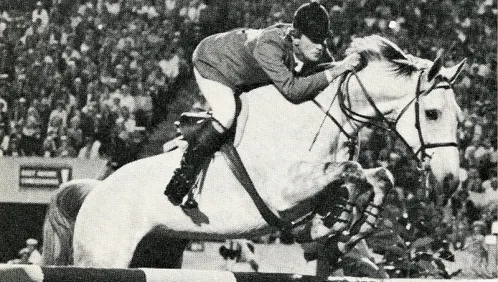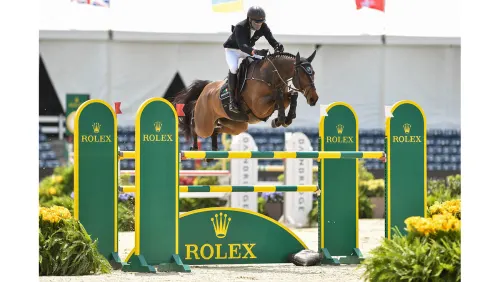Four horses test positive, and now the team bronze medal may be at stake.
Just before the individual show jumping final on Aug. 21, results of drug tests taken on Aug. 18 and 19 were revealed, showing the presence of the same banned substance in four horses.
 Norway’s Tony Andre Hansen, Ireland’s Denis Lynch, Brazil’s Bernardo Alves and Germany’s Christian Ahlmann were suspended before the individual final due to the presence of capsaicin found in their horses Camiro, Latinus, Chupa Chup and Cöster.
Norway’s Tony Andre Hansen, Ireland’s Denis Lynch, Brazil’s Bernardo Alves and Germany’s Christian Ahlmann were suspended before the individual final due to the presence of capsaicin found in their horses Camiro, Latinus, Chupa Chup and Cöster.
Capsaicin is classified as a “doping” prohibited substance given its hypersensitizing properties and as a “medication class A” prohibited substance for its pain-relieving properties. It is applied topically.
“It’s a derivative of a chili pepper plant, which is used in human and veterinary medicine,” said Paul Farrington, member of the Fédération Equestre Internationale veterinary commission. “By producing pain relief it would affect performance, and by producing a burning effect it could enhance performance.”
The drug has always been considered illegal, but scientists have just discovered how to test for it in the past two years. The only previous positive test was found in a race horse.
A Grim Reminder
Under new accelerated medication control procedures, the FEI suspends all competitors who test positive in doping at the Olympic Games.
Ahlmann was notified of his suspension Aug. 20, after receipt of test results by the FEI from the Hong Kong Jockey Club Laboratory. A preliminary hearing was held Aug. 21, before a member of the FEI Tribunal, who confirmed the suspension, and Ahlmann was on a plane home that evening.
| Timeline For Positive Drug Tests
Aug. 18-19: Samples received from Cöster (Aug. 18) and others (Aug. 19) |
For the Germans, the case was a grim reminder of the positive drug test that revoked their team gold medal at the 2004 Athens Olympic Games. Ahlmann was a member of that team, which ended up with the bronze after Ludger Beerbaum’s horse tested positive for a different ointment.
“We don’t know enough facts yet to condemn anybody, but our disappointment is huge considering everything that has been done to avoid something like this happening,” said German Chef d’Equipe Reinhard Wendt, who added that all German horses were tested in quarantine and upon arrival in Hong Kong. “We have done a lot, but now we have to find out where we have not done enough.”
The other three riders were notified Aug. 21, upon the receipt of their positive results. All three are provisionally suspended.
ADVERTISEMENT
“The FEI made the decision in April to apply a provisional suspension after the A result,” said FEI Secretary General Alexander McLin. “The preference is to stop riders from competing rather than disqualifying them after the fact. It’s believed that the risks to the sport are such that it’s better to deal with these issues up front.”
Upon report of a positive B sample, evidence and written submissions will be requested from the rider, and a three-man panel of the FEI Tribunal will be appointed. This panel will decide the applicable sanctions and provide for a hearing to be held as necessary. The competition results will be amended as indicated in the Tribunal’s final decision.
“It is not yet determined if Norway will lose the bronze,” said McLin. “That’s a determination for the FEI Tribunal to make at a later date.”
| Riders React To Medication Cases
“I’d like to believe there is a fair playing field, and we do our best and our horses are No. 1.” “It’s not great for our sport. If all four [substances found] are the same, it might be as simple as the testing is getting better. It sounds a bit of a worry to me.” “It’s not good for the publicity of our sport.” —Rodrigo Pessoa of Brazil “People shouldn’t be doing this. It’s a sad day for the sport. We all know that there’s pressure out there.” “It’s a shame for our sport. We hate to hear things like this.” |
As of Aug. 21, 15 show jumping horses had been tested, through blood or urine or both, including one member of each medal-winning team, and more were tested that night after the individual final. The 40 horses tested for dressage and eventing were all clean.
“This is certainly a serious blow to our sport,” added McLin. “We are very well aware of the possible implications to jumping and equestrian sports in total. It is serious because in all four cases the positive result was for the same substance. I’m not sure if we can call it a trend, but it adds to the seriousness of the case.”
From Glory To Disgrace
No medal winners were more excited than the Norwegian show jumpers who took team bronze. With only about 10,000 active competitors in the country, their win was a monumental feat, achieved with the help of Swedish trainer Sylve Soderstrand, who’d coached the Swedish team to silver in the 2004 Athens Olympic Games.
Norway hadn’t even fielded a team since 1936, said anchor rider Hansen, whose 1-fault round clinched the team bronze for himself, Morten Djupvik, Geir Gulliksen and Stein Endresen.
ADVERTISEMENT
“To get the bronze medal is not only a dream, it’s like winning gold,” said Gulliksen.
But after results of doping samples returned, suspending Hansen, that medal seemed likely to be revoked in the coming weeks.
“It’s quite absurd. I’ve never heard of anyone testing positive on this, and to have a number of them…” said Hansen’s teammate, Djupvik. “I trust [Hansen] 200 percent. He still can’t believe what’s happening. We firmly believe we won [the bronze medal] fairly. He’s devastated.”
Hansen, 29, a guitarist and back-up singer in a band called Ovation, finished as the top qualifier for the individual final, with only 3 time penalties over the first three rounds.
Lynch Said Drug Violation A Mistake
Denis Lynch explained how Latinus tested positive for capsaicin, the banned substance that prevented him and three other riders from competing in the individual show jumping final at the Olympic Games, Aug. 21 in Hong Kong.
He commonly applies a topical substance called Equi-Block to his horse’s back to loosen the muscles before working, he said. The label on the bottle he produced read, “Contains capsaicin—will not test.”
“He used it the entire year, including in his wins at La Baule [France] and Rome [Italy], and the horse has always tested negative,” said Irish team veterinarian Marcus Swail. “It was a considerable surprise to us that he tested positive today. Denis was so sure it wasn’t a problem that he didn’t even think to draw it to my attention.”
No show jumping horse has tested positive for capsaicin before this event, but the substance, derived from chili peppers, can be used to create a burning sensation or as a painkiller, said Fédération Equestre Internationale veterinarian Paul Farrington.
Lynch said he begged officials to allow him to participate in the final. “I don’t think I’ve done anything wrong,” he said. “I have nothing to hide. Latinus is ranked No. 1 in the world, and that says enough for him.”
Swail said the rules for allowed substances need to be more clear. “The difficulty as a treating vet is that there isn’t a list of medications under a heading, where individual substances are listed. It’s not like you can go to a list and say [that substance] is OK or not OK,” he said. “The nature of what is described in the list is very general, and the reality is that on too many occasions we only find out what is and isn’t allowed when people test positive.”
David McDonald, director of Horsesport Ireland, said that Irish officials had taken extra precautions this year, after Cian O’Connor was stripped of the individual gold at the 2004 Athens Olympic Games for a positive drug test from his horse, Waterford Crystal.
“We were absolutely keen to take every precaution that this wouldn’t happen,” McDonald said. “The horse was tested when he got here, although not for this substance, and he was negative. We made full use of the elective testing procedure when we got here. We’re about saying it as it is; we haven’t consulted lawyers. This is what we told the [FEI] Tribunal. It’s an absolute catastrophe for Denis and the horse. His chance for an individual medal is gone, and I can’t think of a more severe penalty.”
“I’m shattered; that’s it, shattered,” said Lynch. “I can’t say any more.”
Beth Rasin














